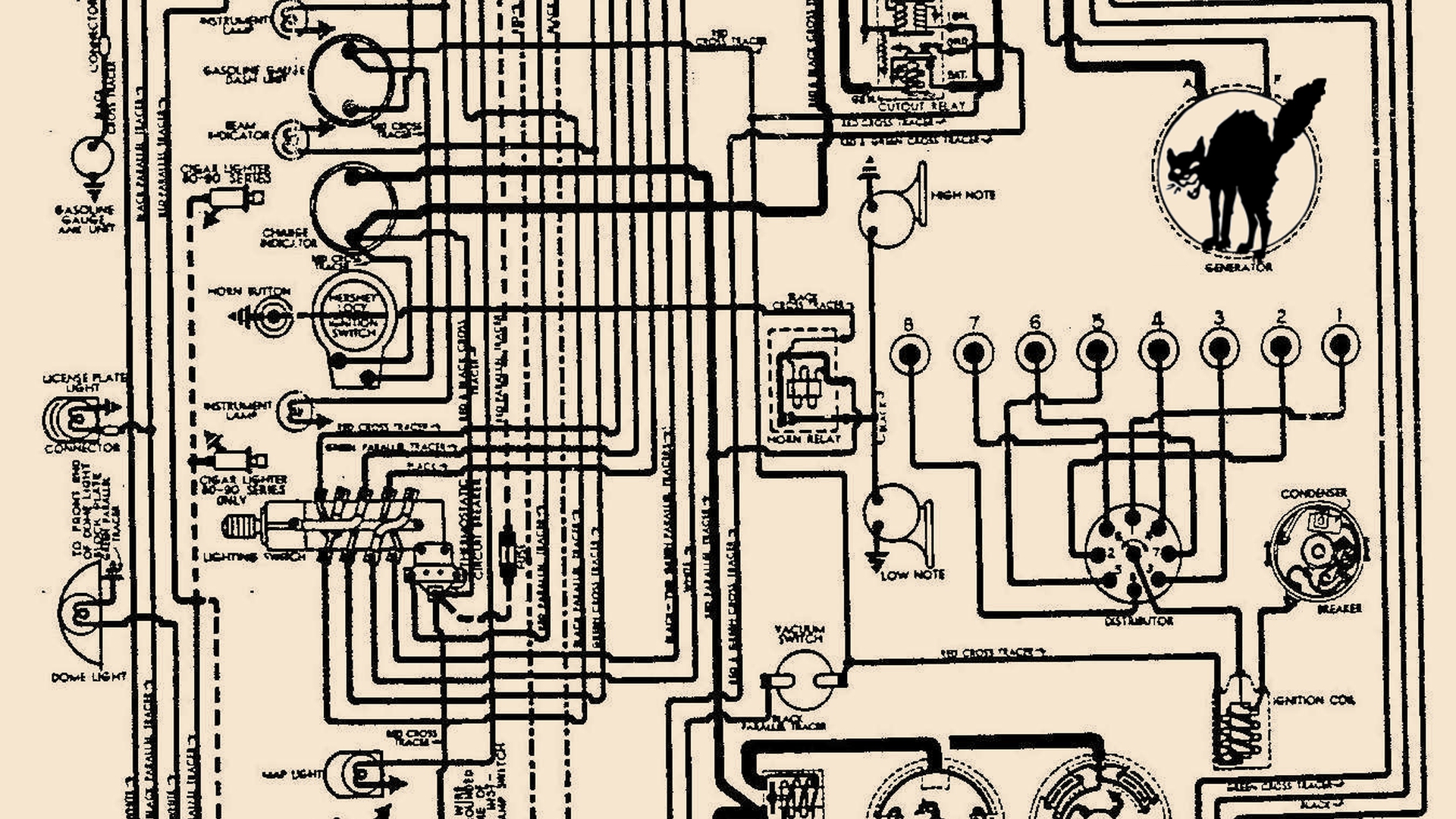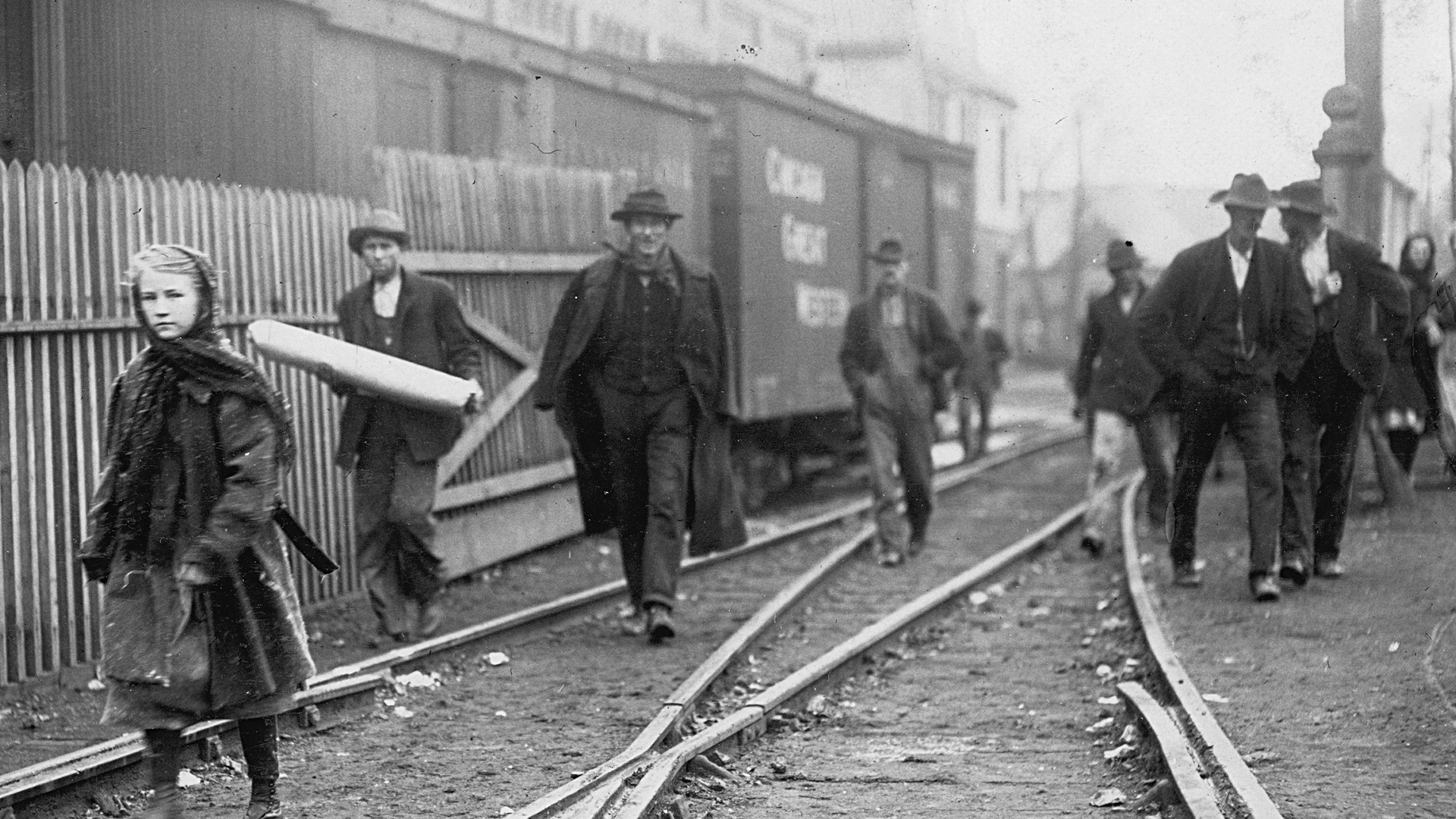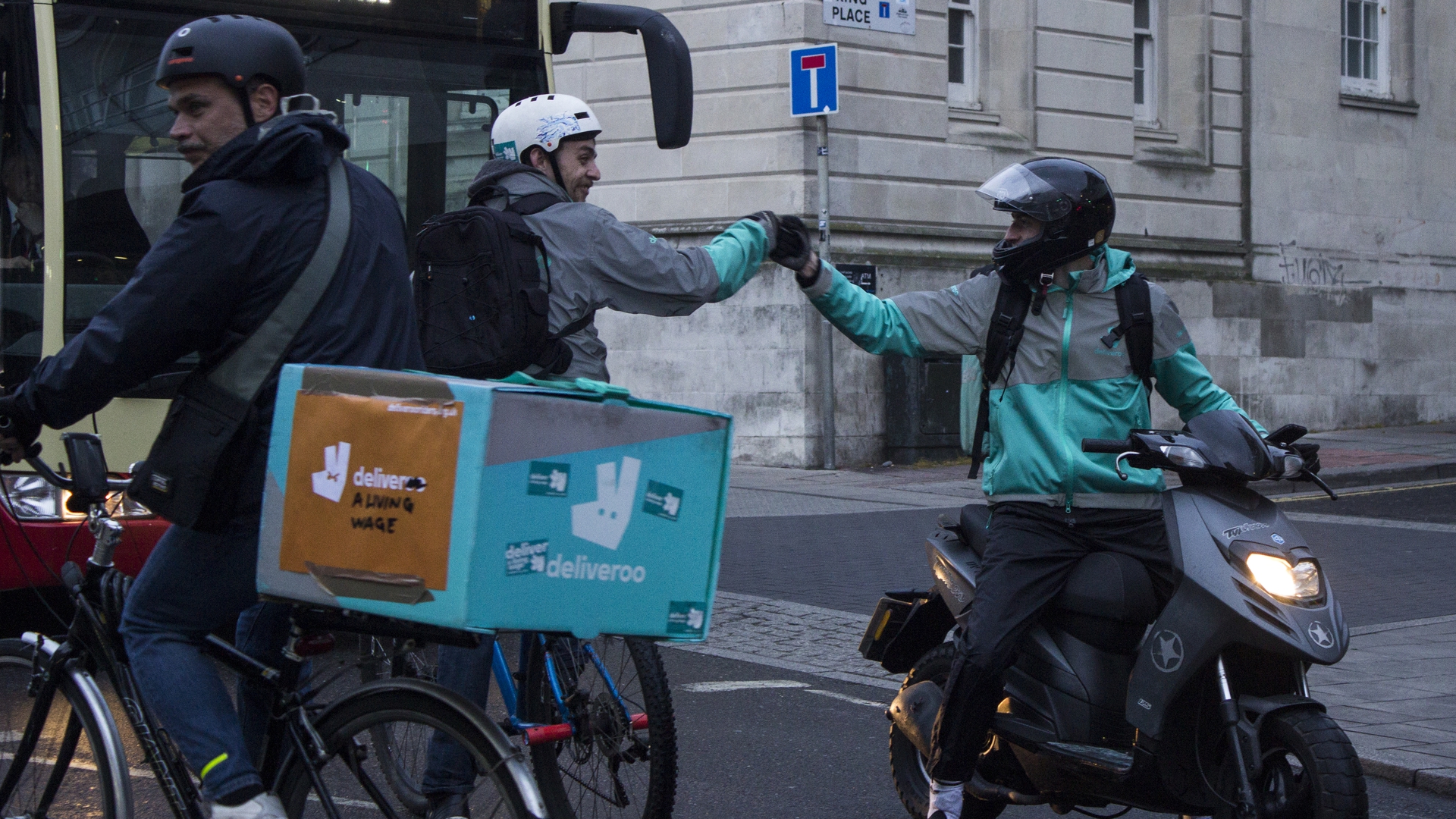Struggle at UberEats
by
Achille Marotta
October 11, 2018
Featured in A Month of Revolt in the Service Sector (#4)
On the conditions of couriers and the future of the struggle

inquiry
Struggle at UberEats
by
Achille Marotta
/
Oct. 11, 2018
in
A Month of Revolt in the Service Sector
(#4)
On the conditions of couriers and the future of the struggle
On Thursday the 4th of October, the Industrial Workers of the World (IWW) organised a nation-wide couriers’ strike against a 40% pay cut imposed by UberEats. The day followed a series of autonomous strikes by London couriers in late September. In just two weeks following the autonomous action, the IWW undertook a rapid organising drive across London for a national strike coinciding with the Fast Food Shutdown. Couriers’ struggle is set to continue, and the IWW is in a better position than ever to develop and coordinate this struggle. We offer here some analysis starting from the knowledge of couriers’ conditions gleaned during the organising drive, moving to a reflection on the day itself and some possibilities for the future.
The origins of workers’ rage
Besides the bosses’ attack on the wage, the causes of the workers’ autonomous action stem from a pre-existing global experience of struggle among food delivery couriers, beginning with the Deliveroo strike of August 2016.
Although this is not the place to trace the history of the movement, we can list several reasons for the existence of widespread self-organisation and struggle among couriers. A first point to note is the unity of conditions of these workers, their equality before the algorithm in a sector which has yet to develop workforce stratifications. This is complemented by the autonomy of the work in relation to the company: unlike cleaners or restaurant workers, couriers are free from the direct domination of managers. A further level of autonomy is given by their legal status as “private contractors” rather than employees, which places many of their tactics outside the scope of trade union law, and therefore within the scope of legality (most notably, wildcat strikes). Although the work itself is highly individual, couriers are concentrated physically in major delivery spots (such as McDonald’s, which accounts for 80% of UberEats’ deliveries), and are also concentrated digitally, particularly through WhatsApp groups for areas and workers of particular national or ethnic groups. Finally, the dangerous reality of street-based nightwork, where couriers are constantly threatened with the theft of their primary means of subsistence (the motorbike) has created a necessity of collectively organised self-defence. All of these conditions mean that couriers - by necessity - already possess a high degree of self-organisation and militancy, outside of any union or political organisation. Organising for October 4th was thus largely a matter of visiting McDonald’s where couriers congregate, and finding key organisers who promised to realise the strike through the pre-existing networks of organisation.
Another condition for the emergence of these struggles among couriers is the “caging” of an entire section of the working class within the sector. Perhaps more than in any other line of work, couriers are couriers because they have no other option. Riders work for a number of companies and often change employers, but experience a reduced “freedom” of labour by their inability to find work in other industries. Workers with irregular documents, for example, easily find work doing deliveries for platforms such as Deliveroo and UberEats as they are able to work on someone else’s account, sometimes while being forced to give that person a portion of their wage. Also notable is the lack of english language skills and the devaluation of labour-power imposed by borders, primarily the nullification of degrees and qualifications gained outside of Europe; this partly explains the predominance of recent migrants - especially Brazilians - in the sector. Finally, racial discrimination keeps a large number of non-white workers trapped in couriering and other lower sectors of the economy. Jobs like cleaning and kitchen portering may offer an alternative to couriering, but these can be undesirable for their low symbolic status and direct submission to a boss, as opposed to the relative freedom and flexibility that comes with being an “independent” private contractor.
The delivery driver working class thus forms part of the lower sections of the London proletariat. Irregular status also means that some couriers - like the mass of ‘informal’ workers in the Global South - do not see the state as an aide, but an enemy. This is also given by the impracticality of the state: if a courier has his bike stolen, it is more efficient to persecute the thief directly together with fellow workers, rather than relying on prolonged, expensive and inefficient police measures. More than in any other part of the working class, neither the courts nor the labour market offer any mediation. Couriers thus find no way out but the struggle.
The strategic terrain
The self-organised strikes in London have shown us how exactly the nature of the work itself (the technical composition) can contribute to a form of struggle which is diffuse, united and “spontaneous”,1 sometimes exhibiting degrees of violence. The analysis of the work has allowed us to explain its direct determination of a series of tactics: those forms of direct action which the wider working class has been deprived of, crushed between industrial decomposition and suffocation at the hands of the state and the unions. An analysis of social composition, on the other hand (the particular form of proletarianisation: the compulsion to accept certain kinds of work), reveals not the tactics, but the future strategy of this particular swathe of the proletariat.
In particular, the caging of workers within this sector means that - at present - the workers’ rage has no safety valve through which to be channelled. The struggles will necessarily have to continue, for the simple reason that workers cannot accept to live on £2.50 per delivery, with or without boost. The pressure will be uncovered in particular once the palliative guarantee of £9 an hour during peak times will be recalled on November 4th. Uber’s potential purchase of Deliveroo would mean an increased locking of couriers not just within a sector, but within a single company. As food outlets increasingly subcontract their deliveries to such companies, this work will increasingly be concentrated and placed under the domination of capital. All of these conditions mean that conflict will not only continue, but intensify. A conflict that the IWW can help develop through coordination and a degree of leadership.
October 4th: A passive strike
An incomplete map of McDonald’s in London used by IWW militants. In the week prior to October 4th, organisers divided into geographical areas to talk to UberEats couriers at each McDonald’s.
The October 4th strike was organised within a mix of rage and demoralisation. The anger at the wage cuts was fresh, and this gave us a ready audience. Every McDonald’s had at least a group of drivers excited about the strike. At the same time, the organising drive followed three days of strike action and violent tactics which achieved nothing from the point of view of demands. It is thus not surprising that while most zones we organised did not go to work, with few exceptions they did not bother with the flying pickets, blockades, tire-slashing and bike-locking which characterised the autonomous strikes in late September. Next to no couriers joined the demonstration in front of the Uber offices. Many stayed home or went to work for Deliveroo or another company. Drivers in one location - who had employed direct tactics in the previous strikes - went to play football in a nearby field, leaving three scabs to their toil. While the passivity of the strikers allowed for much work to continue, the true loss was not the missed economic damage on UberEats, but the low level of development and diffusion of the struggle among the mass of couriers in London and the UK. Flying pickets would have meant the circulation of the strike to all sites which we had not organised or where the militant workers did not have enough power. Blockades (“hard pickets”) and other direct methods would have enforced and expanded the power of the more resolute sections of the workforce.
Most importantly, active pickets would have been able to form a true connection between riders and McDonald’s staff or other fast food workers. Here it is important not to make the connection “from above”, as an ideological concept of “solidarity” or “coalition” between “workers”, understood as a generalised abstraction. The connection needs to be made from below, from the simple fact that, in their everyday working lives, couriers and fast food workers are workmates. We thus have to seize on the co-operation of these two groups of workers: one is directly employed by McDonald’s and makes the food, the other is subcontracted and delivers this food. Both are producing surplus value together for both McDonald’s and UberEats. Both spend the majority of their waking hours at this McDonald’s. In one site we saw the friendship between a McDonald’s worker and couriers of the same ethnicity: it is these pre-existing relationships that need to be organised for struggle against the food commodity chain.
In spite of the passivity of the strike, the organising drive was successful insofar as it brought the IWW and associated activists into contact with a wide number of workers across the city. In a matter of a week, union organisers have developed relationships with key militants in a majority of London zones, as well as significant knowledge of their conditions, needs, and forms of struggle and organisation.
November 4th: steps towards a revolutionary workers’ movement
November 4th is the day that the minimum income guarantee ends. Unless Uber introduces other palliative measures, the pay cut will mean the immiseration of workers, but also their increased dependence on the work. In order to make ends meet, workers will have to be logged in more often, take more orders, and more will have to keep both the UberEats and Deliveroo apps on at the same time. The rhythm will be more frenetic, and the work will be more dangerous as drivers are forced to make their way through the city at frenzied speeds. The effects on the struggle are contradictory. On the one hand, as it will be laid bare that Uber has given couriers a dramatic paycut, fighting will not only be a growing necessity, but an increasingly justified act of self-defence. On the other hand, the misery and dependence on the job will mean that some workers will find scabbing more necessary, and strikes may take on a more confrontational character, as success will depend on more the militant workers imposing their will on the rest of the workforce. The only alternative to this is for both couriers and the IWW to increase their scope of organisation, persuading the less willing workers to prepare for the next wave of struggle.
As organisers, we must extend our role as “postal workers” of the struggle,2 connecting couriers and informing them of struggles happening around the country and around the world. It should become a habit for us to pass by our local McDonald’s and talk to the couriers. We should also consider the role of unions as mutual aid organisations in relation to the needs of couriers themselves, particularly a) developing a fund for helping couriers with injuries along the lines of the London Courier Emergency Fund; and b) helping workers - especially workers with irregular papers - in their struggle against the state. Couriers have already used the IWW WhatsApp group, for example, to signal the presence of Immigration Enforcement vans and raids. This kind of activity could be generalised as a service offered by unions or other organisations, together with the stepping up of materials and information on the anti-worker and anti-migrant character of the state. This would allow us to raise the level of organisation and confidence of couriers on the one hand, and gain their trust as a union on the other.
At the same time, organisers should seek to replace themselves, delegating organising tasks to militant couriers and making them into organisers themselves. This not only means equipping them with basic organising skills, but offering political education and leadership as well. For example, we should explain to couriers that fast food workers are their workmates, emphasise the fact that they produce profits together for the same bosses, and that couriers should take the opportunity to tell fast food workers about their own strikes and encourage them to take action themselves. We could also consider the role these workers could play in the anti-fascist movement, not just by mobilising them ideologically but by inviting them to assert their interests as migrants and people of colour. The diffuseness of this workforce - its mobility, militancy and presence across the city - is an invaluable asset for the whole of the workers’ movement.
In all likelihood, the next wave of struggle will originate outside of the will of any union. But the IWW, with the roots it has built among couriers, is in a position to contribute to the development, coordination and effectiveness of the movement. Future strikes will be an opportunity for the IWW Couriers Network to fuse itself with the self-organisation of the workers and become a more permanent and widespread vehicle of struggle. But to this we will need a wider and more coordinated network of activists to establish long terms relationships of solidarity with couriers. Please get in touch with the IWW to find out how to join.
-
By this we don’t mean that struggles emerge reflexively or unthinkingly, but rather freely, willingly, voluntarily. The autonomous strikes were in fact very premeditated and well organised by groups of couriers themselves. ↩
-
‘The groups of militants ‘from outside’ who got their contacts at the factory gates now saw their tasks as taking care of the ‘horizontal circulation of struggles’. I.e. to distribute a leaflet or a small newspaper with the information about a small strike in one factory to workers in other factories in the same region. Or to make known the strike in one department to workers in the whole factory. There were also always attempts to include workers themselves in the editorial groups of these newspapers. A then militant from Potere Operaio biellese [Workers’ Power, Biella region] described the role of these ‘externals’ like this: “We were the postmen of the workers”. And Guido Bianchini from Potere Operaio veneto-emiliano [Workers’ Power, Veneto-Emilia region]: “We wanted to help to spread these struggles, to break the old structures… We went to the factory gates, but not to preach, we didn’t want to be the party that sets the tone. We asked the workers what they wanted”’ Wildcat, The Renascence of Operaismo. ↩
Featured in A Month of Revolt in the Service Sector (#4)
author
Achille Marotta
Subscribe to Notes from Below
Subscribe now to Notes from Below, and get our print issues sent to your front door three times a year. For every subscriber, we’re also able to print a load of free copies to hand out in workplaces, neighbourhoods, prisons and picket lines. Can you subscribe now and support us in spreading Marxist ideas in the workplace?
Read next

Workers' Inquiry: A Genealogy
by
Salar Mohandesi,
Asad Haider
/
Jan. 29, 2018

